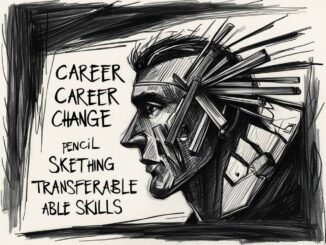
Are you a recently unemployed Gen Xer facing an unexpected career crossroads? Whether it’s due to layoffs, industry changes, or a personal urge for something new, figuring out how to change careers can feel overwhelming. But it’s also a chance to reinvent yourself and find a job in a new industry that brings fulfillment. With years of experience behind you, you have a unique advantage to make this transition a success. In this guide, we’ll walk you through a step-by-step process to switch careers smoothly, tailored specifically for someone in their 40s or 50s navigating today’s job market.
Steps to Successfully Change Careers
Self-Assessment: Know Your Strengths and Passions
The first step in how to change careers is understanding yourself. Take a moment to reflect on your career so far. What skills have you mastered? What achievements are you proudest of? Think about what energized you in past roles—or even outside of work, like hobbies or volunteer activities. For instance, if you loved leading teams in your old job, leadership skills could translate anywhere from project management to education. Your decades of experience are a goldmine of transferable skills—don’t underestimate them. Tools like the Myers-Briggs Type Indicator or online career quizzes can help clarify your strengths and interests. Also, ask yourself: what matters most now? Flexibility? Purpose? This self-assessment lays the foundation for a successful career shift.
Research Potential Careers
Next, dive into researching industries and roles that match your skills and passions. The job market has evolved since you started your career, so explore growing fields like healthcare, technology, or renewable energy, where demand might align with your abilities. Use resources like the Bureau of Labor Statistics to check job outlooks or read industry blogs to see what’s trending. Don’t shy away from unfamiliar territory—your fresh perspective could be an asset. For example, if you’ve always been good with numbers, a pivot to data analysis might work, even if it’s new to you. Research helps you pinpoint realistic options and sets you up for the next steps in how to change careers.
Network and Build Connections
Networking is a game-changer when switching careers, especially for Gen Xers with established contacts. Reach out to former colleagues, friends, or even acquaintances who might connect you to your target industry. Platforms like LinkedIn are gold—update your profile, join groups, and comment on posts to get noticed. Attend virtual or in-person industry events to meet new people. Don’t be afraid to ask for informational interviews; a 15-minute chat with someone in your desired field can reveal insider tips and open doors. Networking isn’t just about job leads—it’s about learning the ropes and showing you’re serious about this change.
Develop Necessary Skills
Once you’ve got a career target, identify any skill gaps. Maybe your new field needs digital know-how or a specific certification you don’t have yet. No problem—online platforms like Coursera, Udemy, or LinkedIn Learning make it easy to upskill from home. For hands-on experience, try volunteering, freelancing, or even a part-time gig in your new area. Say you’re eyeing a marketing role: taking a course on social media ads and managing a small campaign for a local group can boost your credentials. This step shows employers you’re proactive and bridges the gap between your past and future career.
Update Your Resume and Personal Brand
Your resume and online presence need to scream “I’m ready for this new career.” Focus on transferable skills—like problem-solving or communication—that fit your target role, even if they come from a different industry. A functional resume, which highlights skills over job history, might work better than a traditional one. On LinkedIn, tweak your headline and summary to reflect your career change goals—something like “Experienced Professional Transitioning to [New Field].” Share articles or posts about your new interest to build credibility. This isn’t just about avoiding age bias; it’s about proving you’re adaptable and eager, key traits for any Gen Xer switching careers.
Master Modern Job Search Strategies
Job hunting has changed since the ‘90s, so get up to speed. Many companies use applicant tracking systems (ATS), which scan resumes for keywords—pull those straight from job postings to get past the bots. Check industry-specific job boards, like TechCrunch for tech roles, alongside general sites like Indeed. Don’t skip company websites; some jobs never hit the big boards. Tailor every application to show how your background fits, even if it’s unconventional. A recruiter who knows your new field can also help. Mastering these tactics ensures your applications stand out in a crowded market.
A Secret to Change Careers: Prepare for Interviews in Your New Field
Interviews in a new industry can feel tricky, but preparation is your edge. Research typical questions for your target role—Google “interview questions for ” to start. Practice explaining your career change positively: “I’m excited to bring my [skill] from [old field] to solve [new field’s] challenges.” If you’re moving from sales to teaching, say, highlight how your persuasion skills can engage students. Rehearse with a friend or career coach to nail your delivery. Confidence and enthusiasm matter as much as your answers—show them you’re not just capable, but passionate about this shift.
Cultivate a Resilient Mindset
Let’s be real: changing careers isn’t always smooth. Rejection or slow progress can sting, especially with financial pressures like mortgages or college tuition looming. Keep a growth mindset—see setbacks as chances to tweak your approach. Break the process into small wins, like finishing a course or making a new contact, to stay motivated. Lean on supportive friends or family who get your vision. Plenty of people have switched careers later in life and thrived—your experience and grit are huge advantages. Resilience keeps you moving forward, no matter the hurdles.
Use transferable skills to land your next job
Conclusion
Switching careers as a recently unemployed Gen Xer is a journey, but it’s one you’re equipped to take. With self-reflection, research, and persistence, you can transition smoothly into a new industry that fits your skills and dreams. Your years of experience aren’t a limitation—they’re a strength that sets you apart. Follow these steps, from assessing your strengths to staying resilient, and you’ll find a job that reignites your passion. Don’t let uncertainty stop you; take that first step today. The next chapter of your career could be your best yet.
akjfrn oenfoqiefoainfoan sdflakmsrlfkqeroirn oqrf erfea Lorem ipsum dolor sit amet consectetur. Ut tellus suspendisse nulla aliquam Risus rutrum ultrices pretium dolor amet consectetur.


2 Trackbacks / Pingbacks
Comments are closed.